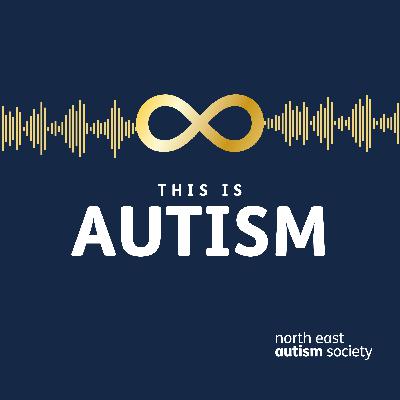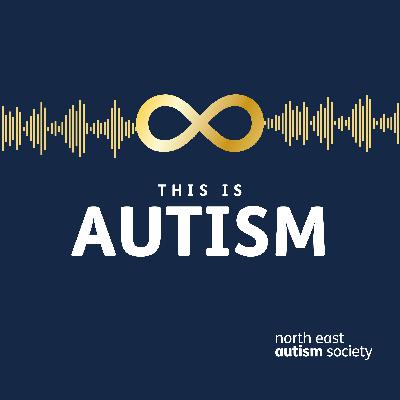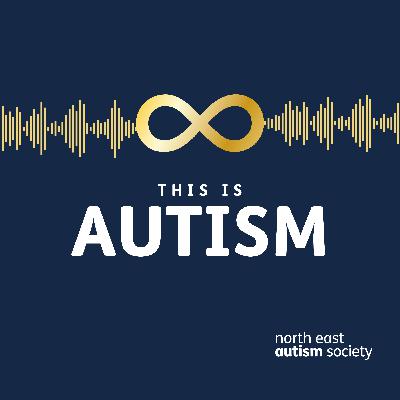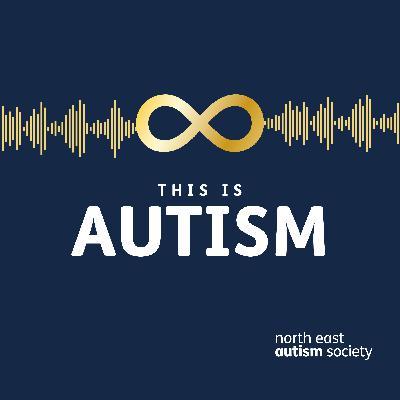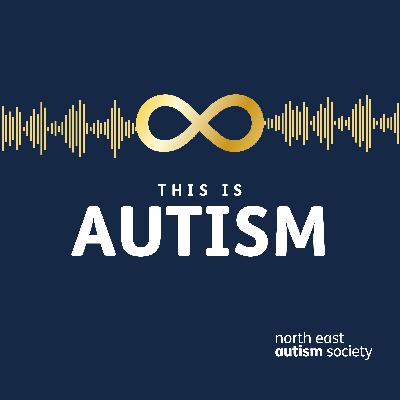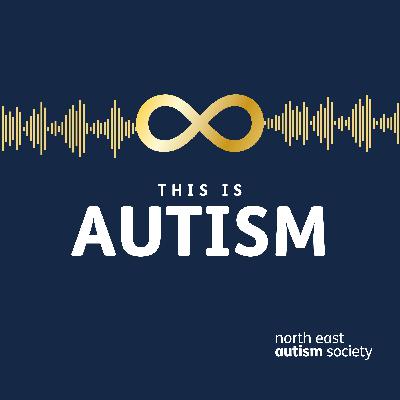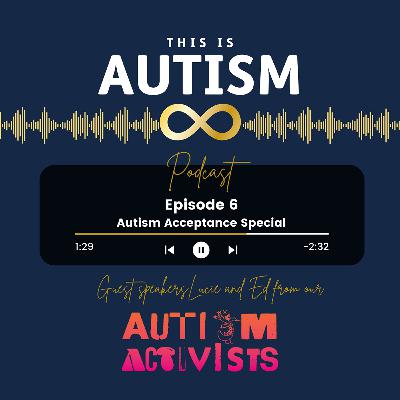Discover This Is Autism
This Is Autism

This Is Autism
Author: North East Autism Society
Subscribed: 20Played: 92Subscribe
Share
© North East Autism Society
Description
This Is Autism explores the subjects that really matter to autistic people and those who care for them, including masking, sex and relationships, puberty and wellbeing. Hosted by the North East Autism Society, the podcast hears from autistic people about how they experience the world, and offers practical advice along the way. If you are autistic or love someone who is, join us as we tackle the issues that don’t often get talked about.
18 Episodes
Reverse
This World Menopause Awareness Day, This is Autism explores a topic that's rarely discussed but deeply important, menopause through an autistic lens.
Our host Kerrie Highcock sits down with Rose Matthews, an autistic researcher and advocate, to talk openly about the realities of menopause and perimenopause for autistic women and gender-diverse people.
Together, they unpack:
* Why menopause remains misunderstood — especially in the autistic community
* The impact of sensory changes, misinformation and stigma
* The urgent need for more inclusive research and honest conversations
Whether you're autistic, supporting someone who is, or simply curious to learn more — this thoughtful, empowering discussion will leave you better informed and inspired to keep the conversation going.
This is Autism is the official podcast from the North East Autism Society, sharing real voices and lived experiences to help us all understand autism a little better.
Listen now, and join the movement towards awareness, inclusion and understanding.
In this episode of This Is Autism, we sit down with Bea, a passionate young autistic advocate, to talk about her experiences navigating the education system. From early school years through to sixth form, Bea reflects honestly on the challenges she faced — friendship struggles, masking, anxiety and burnout.
Bea shares how a lack of early understanding and support affected her mental health and school attendance, but also how finding the right environment, such as Newcastle Bridges School, helped her rebuild confidence and feel truly supported. She opens up about the pressures of fitting in, internalised ableism, and the emotional toll of constantly having to explain and justify her needs in order to access support.
The conversation also covers key themes like autistic burnout, the importance of safe spaces and special interests, and the role families play in supporting young people through education. Bea's story highlights both the systemic issues within mainstream education and the transformative power of inclusive, compassionate approaches that value autistic voices.
Whether you're a parent, professional, or autistic young person yourself, Bea's journey offers insights into what needs to change to make education truly inclusive.
In this episode of This is Autism, host Kerrie Highcock, Family Development Manager at the North East Autism Society, sits down with Dr Amy Pearson, a late-identified autistic researcher and assistant professor in psychology at Durham University. Amy's work focuses on the lived experiences of autistic adults, with a particular emphasis on relationships, masking, and victimisation.
Kerrie and Amy explore the findings of Amy's award-winning research into interpersonal victimisation—specifically the abuse autistic people may face from those closest to them. Amy explains what interpersonal victimisation means, why autistic people may be more vulnerable in relationships, and how societal framing and masking contribute to these risks.
The episode also celebrates Amy's new book, which has already received glowing feedback. It's an insightful conversation that sheds light on the challenges autistic people face in forming safe, meaningful connections, and what we can do to support.
💬 Listen in to hear:
* Why autistic people may be more vulnerable in relationships
* The role of masking and societal expectations
* What interpersonal victimisation really means
* How Amy's research is changing the conversation
In this episode, North East Autism Society's Family Development Manager, Kerrie Highcock, speaks with Lauren Osbourne — a talented illustrator and author who has been self-employed since graduating with an MA in Design in 2022. Lauren shares her journey as an autistic creative, from illustrating six published books to writing her own, It's Ok to Be Me.
Together, they explore the highs and lows of self-employment, why it can be a meaningful path for autistic individuals, and how Lauren has built a career that works for her. With only 3 in 10 autistic people currently in employment, this conversation shines a light on alternative routes to success — and why creating your own path can be empowering.
Whether you're autistic, a parent, educator, or employer, this episode offers valuable insight into how self-employment can support autistic strengths and authenticity.
In this episode, Kerrie Highcock, Family Development Manager at the North East Autism Society, is joined by Nic King—an autistic trainer, consultant, and founder of PANDAS Online. Nic is also a parent to two neurodivergent children and brings both lived and professional experience to today's conversation.
Together, they explore what it means for autistic young people to understand and embrace their identity. From discussing the importance of a positive autistic identity to when—and how—families might share an autism diagnosis, Nic offers thoughtful, compassionate insights rooted in authenticity and empowerment.
Topics covered include:
· What is a positive autistic identity?
· Is there a "right" or "wrong" time to share a diagnosis?
· How can families approach these conversations?
· The story behind Neurobears—and why pandas?
· Why a strengths-based model matters
· Agency, autonomy, and future plans
James Henderson, 33, from Sunderland, opens up on our 'This is Autism' podcast about life before and after receiving his autism and ADHD diagnosis at 32.
Struggling with anxiety, frustration, and mental health challenges, it was a single Instagram post that sparked James's journey to understanding himself. "It described this rage that starts in your stomach and spreads through your whole body. I wasn't violent — just so irritated all the time. That's when I realised, I needed to do something."
James shares how therapy and support led him to his diagnosis, and helped him finally make sense of his experiences and who he is. Around 70–80% of autistic people experience mental health conditions, yet many face misdiagnosis, stigma, and a lack of proper support.
In the UK, 70% of people in inpatient mental health hospitals are autistic. Let's talk about autism, mental health, and why early support matters. Special thanks to host Alex Davies and Brothers of Purpose Podcast for producing this episode.
Time codes for this episode:
2:00 [https://www.youtube.com/watch?v=nnngX2JT544&t=120s] Late diagnosis
2:23 [https://www.youtube.com/watch?v=nnngX2JT544&t=143s] The Instagram Moment
3:33 [https://www.youtube.com/watch?v=nnngX2JT544&t=213s] Therapy
6:30 [https://www.youtube.com/watch?v=nnngX2JT544&t=390s] Anxiety
11:00 [https://www.youtube.com/watch?v=nnngX2JT544&t=660s] Childhood
12:45 [https://www.youtube.com/watch?v=nnngX2JT544&t=765s] Diagnosis
18:00 [https://www.youtube.com/watch?v=nnngX2JT544&t=1080s] Changes after diagnosis
20:00 [https://www.youtube.com/watch?v=nnngX2JT544&t=1200s] Mental health
21:00 [https://www.youtube.com/watch?v=nnngX2JT544&t=1260s] ADHD and medication
24:45 [https://www.youtube.com/watch?v=nnngX2JT544&t=1485s] Life after diagnosis
28:00 [https://www.youtube.com/watch?v=nnngX2JT544&t=1680s] School
33:00 [https://www.youtube.com/watch?v=nnngX2JT544&t=1980s] Impact of diagnosis and work
37:30 [https://www.youtube.com/watch?v=nnngX2JT544&t=2250s] Sense of justice
40:00 [https://www.youtube.com/watch?v=nnngX2JT544&t=2400s] Communication
41:00 [https://www.youtube.com/watch?v=nnngX2JT544&t=2460s] Masking
45:00 [https://www.youtube.com/watch?v=nnngX2JT544&t=2700s] Perception
Just 1 in 5 autistic people are in employment - the worst rate of any disability group.
Ashley Jones, Business Analyst for the North East Autism Society shares his experience of being diagnosed autistic, finding employment, supporting employers and helping others find their dream jobs.
Episode breakdown:
1:50 Diagnosis
3.55 What does autism mean to you
7:55 Masking
9.28 Barriers to employment
11:00 Reasonable adjustments in the workplace
13.40 Positive disclosure
14:45 Common misconceptions
16:44 How can we make employment better
Research shows that getting the right support early on can make a big difference to a child's experiences at school and their mental health further down the line.
However, hundreds of thousands of children are currently on the waiting lists for an autism diagnosis, with their families often having to cope by themselves while they wait.
In conversation with Kerrie Highcock, Family Development Manager at NEAS, Dr Helen Leonard and Mum, Lyndsey Morgan, explore how the process works, what parents can do, and why early support is so important.
Find out more about our Little Stars appeal - www.ne-as.org.uk/little-stars
Katie Toner shares her journey of self-discovery, explaining how, before her diagnosis, she often felt anxious and out of place. After receiving her diagnosis, Katie realised she wasn't broken, just different, and began to understand how to thrive in her unique way.
Using her personal experiences, Katie now helps neurodivergent children and young people embrace their individuality and learn to communicate their needs. She founded Dark Sky Sleepovers, [https://www.darkskysleepovers.co.uk/] a business offering themed events, and The Wild Bunch [https://www.linkedin.com/in/katie-toner-unite-club/], which provides training in sensory regulation.
In this episode Katie talks to Kerrie Highcock, family development manager at NEAS about the diagnostic process and how it has shaped her life.
In this episode Kerrie Highcock, family development manager at NEAS chats to Amy Burgess, who was diagnosed with ADHD at 15 and as autistic at the age of 20. Amy is a psychology graduate who is passionate about sharing her experiences with others about what it is to be neurodivergent.
Amy says she didn't really understand who she was or how she experienced life until she lived away from home at university. This episode talks about transition from school to adulthood.
The theme for Mental Health Awareness Week is "Moving more for our mental health".
Dr Patrick Jachyra is someone who knows all about this. Patrick is assistant professor in sport and exercise sciences at Durham University and he researches how to support the physical activity and mental health of autistic people.
This is all the more important since statistics show neurodivergent people experience more mental health challenges than the general population.
Music: Aukestra [https://www.aukestra.com/]
Join us for our Autism Acceptance special featuring two of our Autism Activists, Ed and Lucie and NEAS Family Development Manager, Kerrie Highcock.
Ed, 18, and Lucie, 15, talk about Autism Acceptance and what it means to them.
Music: Aukestra [https://www.aukestra.com/]
Anecdotally, we've known for a while that autistic people are more likely to identify as LGBTQIA+ than non-autistic people, and research is now beginning to support this. This episode will explore the intersection between autistic and LGBTQIA+ identities, looking at the issues facing autistic people as they explore their sexuality and gender identity.
Erin Ekins [https://queerlyautistic.com/]talks to our Family Development Manager Kerrie Highcock about her personal journey as a queer autistic person, and what professionals and parents can do to support autistic people on their journey.
Music: Aukestra [https://www.aukestra.com/]
This Christmas we're focusing on what the festive season means to autistic people and their families, and how to make the big day more inclusive. So, welcome to a Christmas takeover by pupils and teachers at our Mackenzie Thorpe Centre school in South Bank, Middlesbrough, as they explain what Christmas means to them .. from sinister Santa to stress-free nativity shows.
Music: Aukestra [https://www.aukestra.com/]
Sex and relationship coach Ness Cooper [https://nesscooper.co.uk/] - herself autistic - talks about sex education for autistic adolescents and how parents can broach the topic with young people. She also dispels the myths around sex and autistic people in her discussion with our Family Development Kerrie Highcock.
Music: Aukestra [https://www.aukestra.com/]
Editing: Niall Hegarty [https://www.linkedin.com/in/niall-hegarty-782b381b9/?originalSubdomain=uk]
Every child and young person is different, but it is possible to spot the signs of autistic masking. Our guests say families should trust their instincts and be prepared to advocate for their child if professionals do not recognise their masking. They also discuss autistic burnout and stereotypes around masking.
Guests: Kieran Rose (The Autistic Advocate [https://theautisticadvocate.com/]), Dr Amy Pearson [https://www.sunderland.ac.uk/about/staff/psychology/amypearson/], Jodie Smitten [https://www.jodiesmitten.co.uk/]
Website: https://www.ne-as.org.uk/podcast
Email: info@ne-as.org.uk
Music: Aukestra [https://www.aukestra.com/]
Editor: Niall Hegarty [https://www.linkedin.com/in/niall-hegarty-782b381b9/?originalSubdomain=uk]
Masking is something we all do to project an "acceptable" version of ourselves - but for those of us who are autistic, it can feel like something we do to survive. It's hard for families and friends to spot, let alone educational and medical professions, yet masking can lead to misdiagnosis and burnout so it's vital we all understand it. Our autistic guests Kieran Rose [https://theautisticadvocate.com/], Dr Amy Pearson [https://twitter.com/dramypearson] and Jodie Smitten [https://www.jodiesmitten.co.uk/]explain what masking looks like, why people do it, and how difficult it is to stop.
Music: Aukestra [https://www.aukestra.com/]
Editing: Niall Hegarty
This Is Autism explores the subjects that really matter to autistic people and those who care for them, including masking, sex and relationships, puberty and wellbeing. Hosted by the North East Autism Society [https://www.ne-as.org.uk/], the podcast hears from autistic people about how they experience the world, and offers practical advice and information along the way. If you are autistic or love someone who is, join us as we tackle the issues that don't often get talked about and get your questions answered.
Music: Aukestra [https://www.aukestra.com/]
Email: info@ne-as.org.uk


